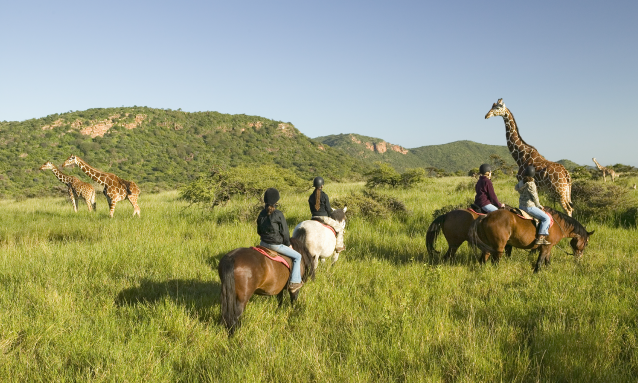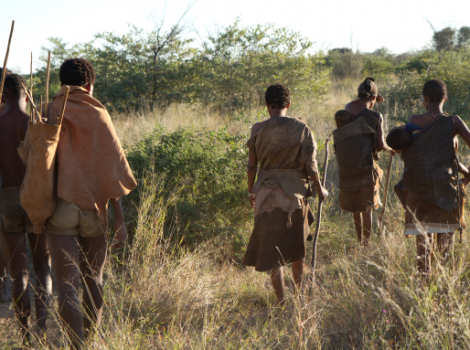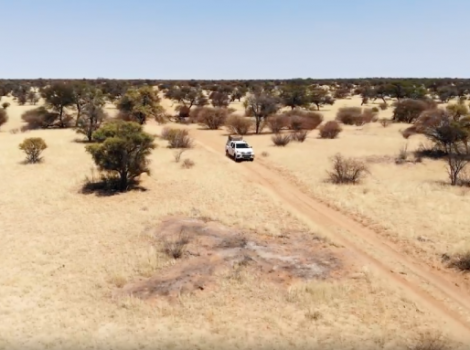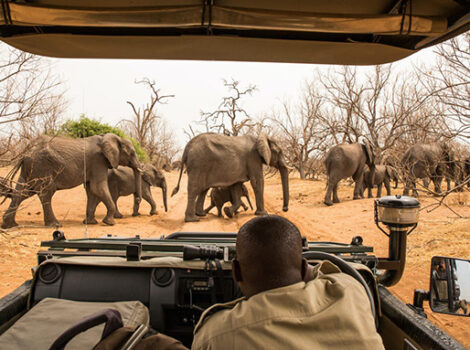
“Be able to gallop out of trouble.”
This riding skill, required by Okavango Horse Safaris to join their horseback tours through Botswana’s Okavango Delta, gave me pause. I’d spent thousands of hours in the saddle since childhood, but mostly inside fenced arenas, never encountering any trouble that might warrant a galloping escape. In this context, trouble meant a confrontation with big game.
As a teenager I jumped horses over four-foot fences, an activity that scared me sometimes and now seems unfathomable. I rode on my college team too, but the onset of adulthood essentially ruled out a hugely expensive, time-consuming hobby involving the keeping of a large animal. I missed having a serious commitment to a sport, and more, I missed the mysterious partnership between horse and rider, the nonverbal communication between two mismatched bodies that, at best, creates a spooky mind meld. But life went on.
I’d stumbled upon the concept of horseback safaris while researching a trek in Patagonia that introduced me to the joy of crossing rugged terrain on horseback. A handful of outfitters run trips in wildlife-dense areas of eastern and Southern Africa, but because of the necessary riding experience, the activity is relatively niche. Though the idea made me nervous, I couldn’t get it out of my head.
I wanted the chance to venture into a world ruled by animals while astride an animal – to be a part of the landscape, away from all the engine noise and clicking camera shutters. I’d seen photos of riders alongside giraffes loping through the shallow floodwaters of the Okavango, and, basically, I needed to do that.
Barney Bestelink, who has owned and run Okavango Horse Safaris with her husband, P.J., since 1986, met me at the airport in Maun, the small town that serves as a jumping-off point for much of the delta, and we climbed into a bubble-fronted helicopter for the 20-minute hop to camp.
“We were the first operation in Southern Africa,” Barney said, “and it really came from a combination of P.J.’s love of adventure and my love of horses.”
Barney has a stash of wild stories (she rode racehorses for the Emir of Bahrain as a child) and the vibe of a charismatic headmistress—mingled warmth and steel, leavened by a roguish sense of fun. She had warned me in advance that the region was stricken by drought, and sure enough the world below looked bone-dry: a flat expanse of sand, rust-coloured brush, and parched trees.
Over the headset she explained that the drought was concentrating wildlife around water sources, good both for predators and voyeurs like us, not great for most other species. The Bestelinks had paid to have five water holes bored and fitted with solar pumps, and guests had chipped in to fund 12 more in the area, sustaining countless animals.
“It’s hectic out there,” Barney said. “Everything’s around. We’re being very careful.”
As we landed at OHS’s main camp, I could barely see the spacious, sturdy safari tents among the trees. Dozens of hippos crowded the water of the nearest borehole, packed so densely their backs looked like cobblestones. An elephant family hurried in from the bush, eager to drink.
When I swung into the saddle at 6:30 the next morning, I felt a sense of homecoming. The creak of the tack and the warm vitality of the horse were profoundly familiar, even in this new place. There were three other riders: Isabel, a 20-something England-to-South Africa transplant; and a pair of Londoners, Paul and Ashley, who’d become friends on a previous riding safari.
As we picked up the trot in a single file, with lead guide Rogers in front and another guide at the back with a rifle, my nerves gave way to exhilaration. There was no sound but the wind and our hoofbeats. The quiet of riding holds environmental as well as aesthetic appeal: No Land Rovers means no emissions, just the occasional contribution of a little grass-based fertiliser.
For the complete article: http://www.cntraveler.com/story/seeing-the-okavango-delta-differently-on-horseback



